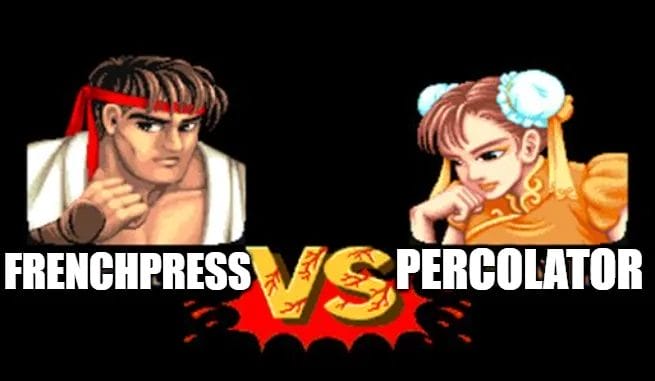The French press and the Percolator are timeless classics of the coffee world and are used by avid coffee drinkers. But when you compare them against each other, who comes out on top in the battle of percolator vs french press?

In today’s battle of the classics, The French Press vs. Percolator, let’s see who is the more effective coffeemaker.
French Press
The French Press is almost as old as the Percolator, but the hype surrounding this classic coffee maker is still strong today, the main reason being its ease of use and its awesome coffee.
The design of the French Press is still the same as before and hasn’t changed much over the years. It consists of 3 main parts.
- A brew chamber
- A plunger
- Metal mesh filter
Both glass and metal brew chamber versions are available, but the metal (stainless steel) version is more popular because it’s really sturdy. In addition, some more expensive models have a double-walled beaker, which helps retain the heat longer.
French press is the best for creating a full immersion brew. This is because the ground beans stay in constant contact with hot water for the whole brewing process.
Pros
- Produces rich, full-bodied coffee
- Consistent brewing results
- Easy to clean
Cons
- Requires a separate kettle
- Coffee can contain sediment
Percolator
The Percolator brew method comes from improvising on a previous method, which was just boiling coffee grounds in water for brewing coffee. It was first invented in the late 1800s. The aesthetics of this coffeemaker just takes you back to the good old days of the cabin in the woods and lovely campfires.
Like the French Press coffee maker, the design hasn’t changed much in all these years. You have a few simple parts in the Percolator:
- A water chamber
- A metal basket
- A pipe
When the water is heated, the pressure pushes the water into the center of the brewer, and then it falls over coffee bean grounds. Due to this occurrence, the Percolator method is also referred to as “Gravity percolation.”
Percolator coffee makers went full electric back in the 1920s and stayed popular till the 1970s. After that, drip coffee makers took the market by surprise and captured everyone’s hearts.
Many have a common misconception that percolators and Moka pots are the same. But it’s not correct. You can brew only once per batch with a Moka pot while percolators push the water through the coffee grounds several times.
Percolators can create really strong brews, but they have a bad reputation for dishing out bad-tasting, bitter coffee cups that lack the depth of flavor.
Pros
- Extra-large capacity models available
- Great for camping
- No extra equipment required
Cons
- Stovetop models require monitoring
- Coffee is easily burnt
Coffee Percolator vs. French Press: The Showdown
If you’re already terrified of the Percolator because of a previous experience, you might think this is a one-sided competition. But, surprisingly, when you think about both these coffee makers, they all have their unique advantages, which makes it a close call.

Brewing Method
The prep takes more time than the brew itself with both these coffee makers, so there isn’t a clear winner here. However, Percolator one-ups the French press when brewing in a larger batch.
In the case of the French press, all you need to do is pre-boil the water and keep your coffee beans grounded. If you’re using an electric kettle, you can boil the water in a minute.
Steeping the grounds in hot water can take around 3-4 minutes. So it’s relatively easy unless you are planning to brew a larger batch or multiple batches of coffee.
When it comes to coffee percolators, you’ll need 5-10 minutes depending on a few different factors, like if you’re using a stovetop percolator or an electric version.
Where coffee percolators win is that you can brew large batches in a shorter time. So if you have a family gathering or a house party, coffee percolators are perfect for the job.
Here’s another “battle of classics” check out the aeropress vs french press war article.
Ease of use
If you have an electric percolator, you can have an easier experience. But still, multiple things are a bit tricky in terms of brewing with a percolator.
The French press is unparalleled and unmatched in terms of ease of use. Even though you need to check on the temperatures and the right timing, getting a fine cup of coffee out of this coffee brewer is just a matter of mixing the hot water in the coffee grounds and letting them sit enough to get the coffee.
If you steep in a French press too long, you might end up with a bitter cup of coffee.
With a percolator, you need to consider things like brew temperature, brewing time, etc. The water needs to be just the right warmth to create enough pressure but not too hot to take the flavor out of your coffee grind. Electric models ease the pressure a bit.
Clean-up
This one is a tie between both, since you have to deal with a lot of wet coffee grounds as the aftermath. But still, a French press is relatively easier to clean than a percolator.
All you need to do is rinse the glass/ metal coffee pot and the mesh filter for the French press.
But for the Percolator, you need to pay extra attention to the perk tube and filter basket, so they don’t hold onto coffee residues.

To prevent grounds in coffee, you might want to read this piece about how to prevent grounds in coffee.
Versatility
This is where the French press takes the cake because we all know Percolator exactly isn’t the most subtle brewing method.
With a French press in your hands, you are in control of your coffee brewing. You can customize any element of the entire process and get a brew that suits your taste buds.
With this full-immersion method of brewing, you can try out multiple styles of brews by tweaking your grind size, brewing method, steeping time, etc.
For percolators, you can’t control pretty much anything besides the grind and the number of coffee beans you use. Of course, you could say the heat source is under your control, but you can’t repeat the same perfect temperature twice, so that’s up to randomness as well.
Portability
Both the French press and the Percolator weren’t designed to be portable, but they both have a bit of potential in this sector.
For a French press, you can’t carry it around as you please, and it’s definitely not a method that’s suitable for a “coffee-on-the-go.” Plus, you need more than just the coffee maker itself to brew yourself a cup.
But if you own a stainless steel French press, you can take it with you when you travel. If you want to have a French press that you wish to travel with, it’s best to avoid the glass version if you don’t want a suitcase full of shattered glass.
The main focus behind the Percolator was to survive high heat and the test of time. A standard percolator made from Aluminum is light enough to travel with, but it won’t be as sturdy as the stainless steel version.
Brew time
This is another win for the French press since this brewer takes the same amount of time, no matter the brew.
When you’re using a French press, you need 4-5 minutes for the brew to complete after you’ve added in hot water.
In the case of a percolator, even if you’re using the electric variation (which is the faster of the two), it’ll take you around 5-6 minutes. However, if you’re using the classic stovetop percolator, the recommended brewing time is 10 minutes.
But in case you’re brewing a large batch, the overall time is faster compared to the time it’ll take to brew the same batch on a stovetop percolator.
Taste
You could have bad coffee with both these brewing methods if you messed it all up. But what about when you try your best?
A French press can give you a full-bodied brew with a rich flavor profile. The coffee offers a more nuanced coffee experience that you can never forget. A French press can also brew strong coffee, but it still won’t be as strong as coffee from a percolator.
If you’re good with a percolator, you can still get a great cup of coffee out of it despite the bad reputation of bitter coffee from the coffee brewer. Where Percolator lacks taste, it makes up in terms of strength (hint: it’s even stronger than espresso or cold brew).
The strength of a percolator cup of coffee might feel like a hard slap in the face to wake you up in the morning.

Pricing
Another easy win for the French press since you can get your hands on a French press coffee machine for as low as $10, even if you’re considering a standard glass French press. Depending on the size, and the build material of the carafe, the price can vary.
A standard percolator costs $40-$60, which is already more expensive than any average French press model. If you choose to get the electric version, it can cost you even more for obvious reasons.
Had fun reading the percolator vs french press article? Then you should check out another “battle of classics” chemex vs aeropress.
Bottom Line
Compared to the Percolator, the French press continuously improved with the times. It became so accessible that anyone can work with a French press if they have basic experience with a coffee brewing device. So it’s easy to see why the French press is an obvious choice.
If you already have either of these brewers, make the best coffee, and get the best of your coffee-making method.
Cheers!
FAQs
French press method can offer you a coffee faster than a standard percolator.
In the battle of percolator vs french press, if you are trying to brew a large batch over a short time, it’s better to use a percolator since you can get a faster brew than the French press.
If you have previous experience with percolators, you’ll find that it’s easy to brew delicious coffee using one. If you don’t pay attention to the details, it’s easy to mess up your brew and get a bitter cup of coffee.
In case you’re camping and need to brew coffee with a percolator, you either need to carry a portable grinder with you, or you can take pre-ground beans with you after grinding them at home.
It’s better to use fresh grounds for every batch you brew, but you can use the same grounds for brewing twice at most.

